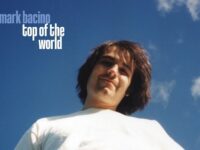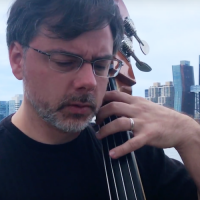New York City-based singer-songwriter, producer and educator Mark Bacino joined Preston Frazier to discuss his writing process and the long-awaited studio album, ‘Top of the World’:
PRESTON FRAZIER: I enjoyed the album, and you have a pretty extensive catalog. There was quite a gap between your last album, Queen’s English and Top of the World.
MARK BACINO: It’s been a long time. It’s just life; a lot has happened since that last record. I’ve got my hands on a lot of things. I’m currently producing for a television outlet here in New York. I’m doing podcasts, radio, similar things, and video work then I’m teaching and doing journalism on and off – add my family priorities, and the pandemic too and its just horribleness. As people who know me know, I’m notoriously slow to make records but then I’m nitpicky. So you throw all that together and get a 14-year gap.
PRESTON FRAZIER: It is a beautiful album. Tell me about when you started the process of writing it.
MARK BACINO: I don’t think I ever have any grand scheme or plan when I start these things. I was pretty hyped – as I usually am after I put out a record – after Queen’s English in 2010, so I was eager to get back into it. I started writing right after we played some shows for that record. While I was writing, we quickly hopped back into the studio. One of my co-producers on this record, Jay Sherman Gottfried, had a studio in Brooklyn at the time with a great producer and piano player named Joe McGhinty. We hopped into his studio and started the album.
We did a couple of those songs that made it to Top of the World, and so that was straight away after the last record – but then things started to slow down, and the writing process became a little more sporadic. I get the little bit of the bump, the high of the release of the record, and then forget about all the trials and tribulations of making the record.
PRESTON FRAZIER: Do you put aside time to write pop songs?
MARK BACINO: I’ve done some stuff for TV and film. I do less of that now. It’s more planned. It’s more like appointment writing. You have a brief, you have to do it, and you have to sit down and make it happen quickly. That’s why I stepped out of it. It’s a bit of a young man’s game. It’s like writing a song at noon, having it recorded, and making it sound like a record. You’re lucky if you have 24 hours to turn these things in. It’s tough. Writing pop songs for myself can be undisciplined. It’s more when the mood strikes and I feel like writing. That also contributes to the length of time between records. You want to wait ’til you have a good collection of tunes. I’d rather have quality over quantity.
PRESTON FRAZIER: It looks like you have a Wurlitzer piano next to you.
MARK BACINO: Yeah, good eye, man. It looks like it was made yesterday because the gentleman I bought it from beautifully restored it. This is a birthday present from my wife, Lynn, a few years ago. I have always wanted to add a Wurlitzer to the studio here, but I never pulled the trigger. I have an old suitcase and a Fender Rhodes out in the house, but they have different sounds. I appreciate them both, but I think I prefer the Wurlitzer. It’s just a beautiful machine. You sit down at it, and right away, for me anyway, songs start to come to you. I’m more of a guitar player, first and foremost, than a piano player but the thing starts when you turn it on. It has that vibe and sound.
PRESTON FRAZIER: It makes a great impression on “Kaylee Hughes,” the first song on the album. But I want to go back briefly and ask about your songwriting process. Do you start with your guitar, piano, or Fender Rhodes?
MARK BACINO: You’re the first person who caught the “Kaylee Hughes” Whirly on there. I played a solo on it, which I’m proud of because I’m not that kind of piano player. But somehow, I pulled that off. To answer your question, the process is fundamental, man. I’ll either sit down at instruments which I have around, or sit around with guitars, pianos, or whatever many musicians do. I’ll pick up a guitar or sit at a keyboard and mess around. It’s always just like playing for me like you’re a kid. I like to try to keep it that way; I think it’s pure. You get to do some incredible things. I mess around. If something comes to me, it’s usually a chord progression first and then a melody, like a nonsensical melody. If I find a chord progression I like, I’ll hum a song over the chords. If I find a vibe I like, I try to match the words to the music.
I’ve had to think about this process because as I mentioned before, I teach songwriting. I had to pick apart my process, which was always more instinctual. Now, I think about it a little more because I had to present it to students. I’ll come up with chords and sing nonsense. I write in sections, thinking, ‘That’ll be a good chorus.’ That sounds more like a verse. I’ll just put it down and maybe walk away from the instrument. I find now the older I get, which is a good thing, that I don’t need the instrument anymore as much once I have a chord progression. It’s kind of just looping in my head. It’s very low-pressure and low-key. If something’s coming, it’s coming. If not, I don’t sweat it. I walk away. You could have a song in 30 minutes or three years.
PRESTON FRAZIER: How are you capturing those thoughts?
MARK BACINO: I have the studio here, but I hardly ever record in Pro Tools on anything until it’s done – probably the most I’ll do is record a voice memo on my phone. I’ll leave it there and maybe revisit it later. If it’s something that’s feeling good, it’ll stick in my head, and then it’s probably good. If you’re remembering it, maybe you should work on that. I try to document stuff because you forget things again as you get older, but if something’s cool, I’ll document it.
PRESTON FRAZIER: You’ve released an excellent video for “Kaylee Hughes.”
MARK BACINO: It’s a fictitious, made-up person. I’ve been told this reflects a New York-type, somewhat cynical outlook. It’s the culmination of all the people we meet who are so super friendly that you don’t even believe they’re real. They’re so super friendly that you ask if they are putting you on. Are they crazy? I don’t know why these ideas stick in my head; all the songs on this record are just like unconventional topics when I look at them. The song is just trying to have fun with that idea of somebody so lovely, and musically, my son Lee Bacino plays drums on this track, so it’s enjoyable to have him on there. He’s a great drummer. It’s not that I’m biased, but he’s a great drummer – so musically, he’s on there. I’m playing Wurlitzer and singing. My co-producer for many years, Ron Zabrocki, plays many instruments: guitars, bass and then horns. We have Michael Leonhart from Steely Dan’s band.
PRESTON FRAZIER: Dark humor plays such a role in these songs.
MARK BACINO: I appreciate you noticing. Yes, it plays a good part in this record’s lyrical content. I used it a bit in the past on the last record, Queen’s English. This record finds my songwriting moving in that direction. I think sometimes I’m using humor as a device to cover heavier topics, but I find that the humor makes them go down easier.
PRESTON FRAZIER: “Flop of the World” is another one of my favorite songs.
MARK BACINO: “Flop of the World” was one of the early ones, coming right after Queen’s English. I was going through a Leon Redbone sort of rediscovery. My dad was into Leon back in the 1970s. We’d see Leon on TV, like late-night TV, and he blew my mind. I thought that stuff was more punk than punk. When I was writing it, there was a vibe. I said, “Let’s accentuate it,” so we added a brass band feel. The lyrics are a play on words, sung from the perspective of a musician who’s a little down on his luck.
PRESTON FRAZIER: Let’s jump to the song “Shaky Hand.”
MARK BACINO: I noticed a lot of interest in people streaming that like on Spotify, which is impressive to me because it’s one of the ballads on the record that’s cool but not like something that people would key in on. Musically, there’s a ’70s vibe but lyrically, it’s a pretty personal song. Maybe 15-20 years ago, I noticed that my right hand was shaking slightly. I went to the doctors, and it’s just like I say in the song: They poked and prodded me; they shot an electric current to see what they could see – and it ends up being a benign tremor. I just went about my business and learned how to deal with the hand; it doesn’t really hinder me too much in the day-to-day.
I’ve been mulling over the song’s concept for years, and I finally decided to write about it. Maybe it’s just getting older, and I wrapped it around the idea that we think we have control in life, but at the end of the day, we don’t have control over anything. I like the last verse, where the protagonist, Lefty, is jealous. He learns he’s got to pay your dues. That’s maybe the best thing I’ve ever written, then. I don’t know where that came from, but I’m proud of the last verse. The song has real strings by a gentleman named Jacob Lawson. He’s another secret weapon of mine, just like Michael Leonhart. That’s all Jacob is doing, just layering real strings on the bridge.
PRESTON FRAZIER: It adds that human quality to a song, which is fantastic. Let’s discuss the song “I Like Wearing Clothes.”
MARK BACINO: That’s probably been around since the Queen’s English days. When we were playing shows for Queen’s English, that song got thrown into the mix. It ended up in the live show because it’s fun to play. I didn’t feel it fit in with Queen’s English, in that song cycle. When it came time to record it with my co-producer, Ron Zabrocki, we felt it had to follow the blueprint of the live performances. There was a solo section that the guitar player and the piano player played. They were playing parts that had to be in the song. Lyrically, you always hear about people writing songs like that. They want to take their clothes off, so I thought, why can’t we write a song about keeping your clothes on? It’s all stemming from the weird thing that I have: I’m not a beach guy; I don’t want to run around under the sun. I think some people can relate to it.
PRESTON FRAZIER: How about the song “How the Story Ends”?
MARK BACINO: That’s the song that was getting streamed the most on Spotify. Surprisingly, the song is resonating with people. There’s a lot of humor in the lyrics. It’s just a take on getting older and living your life on your terms. You can go one way or another with your life decisions, but you won’t change how the story ends. The tune has an “Oh Darling” Beatle-esque vibe. Michael Leonhart added another great horn section, too. It’s a fun track with a little bit of mortality to it.
PRESTON FRAZIER: You have that wonderful interlude with “He Never Saw It Coming (Accidental Death of a Clown).” I couldn’t figure out what instruments were on that. A celeste? A xylophone?
MARK BACINO: I think you’re right on all accounts. Michael Leonhart plays horns again on that track, and my co-producer plays almost everything except the drums. That song has a humorous vibe, thus the title, “He Never Saw It Coming (Accidental Death of a Clown).” It’s just me picturing this narrative in my head. I had a field recording that I took when I was at the circus with my kid. I thought this was going to be useful for something. When I was writing this song, I had a picture in my head of a clown who left the circus and was going down the street. Then, at the end of the song, there’s the sound of a piano crashing as he gets hit by a piano. I don’t know if that makes any sense to people listening to it when they look at the title, and then they hear the song, and then the piano crashes at the end of the song – like, probably not, but it made sense to me!
PRESTON FRAZIER: The instrumentation is gorgeous. It’s interesting.
MARK BACINO: There’s a lot of stuff for two minutes; that’s not something I’ve ever shied away from.
PRESTON FRAZIER: Before I let you go, what are your top 5 favorite albums?
MARK BACINO: In terms of my five favorite albums, an impossible feat for me changes from day to day, but I’ll give it a try. In no particular order: The Beatles – Revolver; The Beach Boys – Pet Sounds; Crowded House – Temple of Low Men; John Coltrane – A Love Supreme; and Wynton Marsalis – Black Codes from the Underground




